“In the land of the legless, the one-legged woman is queen.”A Zed & Two Noughts [Z+00 / ZOO] (Peter Greenaway, 1985)
Dec
27
Visit The Zoo Day
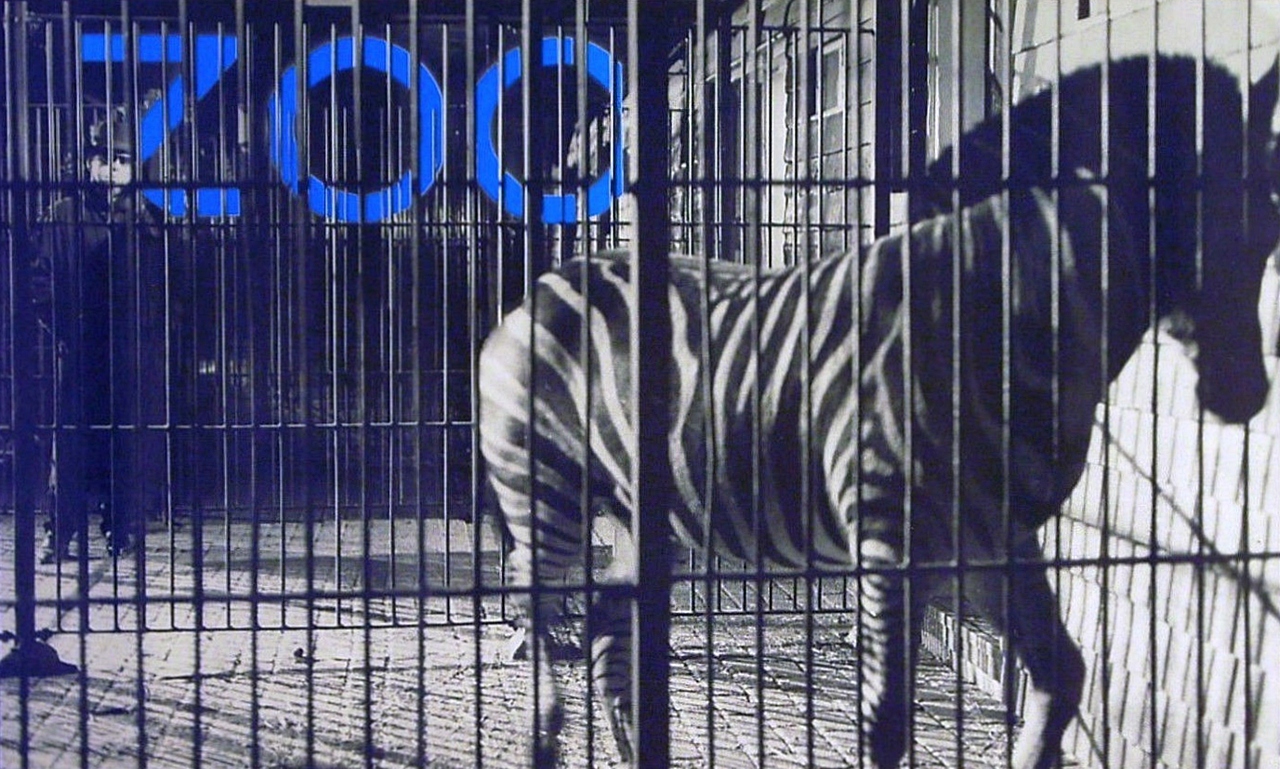
A zebra in a cage with the word ZOO in large blue lit capitals in the background. In the background a man. All but the lettering is black-and-white. DP: Sacha Vierny.
A zoo for National Visit The Zoo Day (USA)
drama
飼育 [Shiiku / The Catch] (Nagisa Ōshima, 1961)
Dec
26
offerings

An altar with two rotund, smiling stone statues – possibly Jizō, a bowl of rice with chopsticks stuck into it, and a Japanese soldier's photograph. The position of the chopsticks tells us that the soldier has died. DP: Yoshitsugu Tonegawa.
Празник [Praznik / The Feast] (Đorđe Kadijević, 1967)
Dec
25
Christmas dinner

Soldiers eating bread at a set table. DP: Aleksandar Petković.
Colloque de chiens (1977)
Monique (Silke Humel, R) spending Christmas Eve in a bar, looking for a way out. She's speaking to an elderly man in an expensive tuxedo. Is this it? DP: Denis Lenoir; still photographer Patrice Morere.
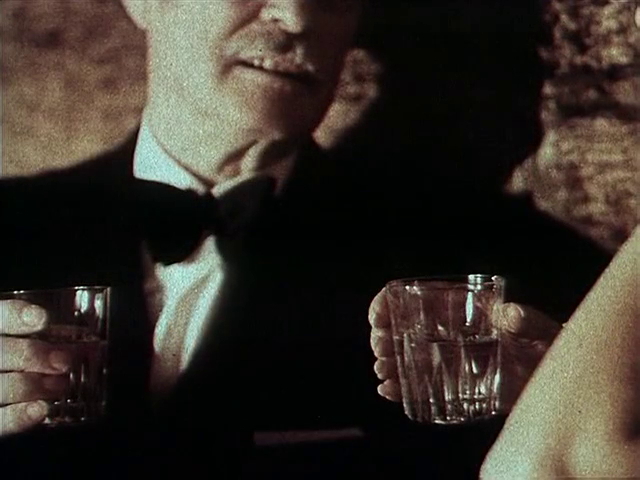
December 24: the night before Christmas (Christmas Eve)
Colloque de chiens (Raúl Ruiz, 1977)
“Nobody knows why Monique, the cold and dry voiced whore, bears in her eyes the sadness and tiredness of her past.”
Filmed during an actors' strike, Raúl Ruiz's Colloque de chiens consists for the most part of still photographs with mixed in stolen moving footage of unsuspecting bystanders and stray dogs. Told in fotonovela format, we follow the pitiful account of Monique, who as a young girl, learns that her mother is not who she thinks she is. Rejected, she throws herself into a life of vice until she meets Henri, a handsome young television repairman. Together they buy a small café, and are happy for once. But the cyclical nature of life determines her faith.
Raúl Ruiz's work is, like Henri's modus operandi, determined by maps and patterns. Even in the short comically melodramatic breathe of Colloque de chiens, the map has been laid out for Ruiz's later, much more complex narrative.
Colloque opens in a barren landscape. There are the skeletal towers of a nearby city, and the endless barks of abandoned dogs. Obscured by tall reeds, a blown-up photograph of a young man. The face, soft and familiar, a distant memory.
“He wanted to be returned to the world of his childhood and to this woman who was perhaps waiting for him” –Chris Marker, dialogue from La Jetée (1962)
Amongst bare winter bushes a large photo of a friendly, young, familiar looking man. In the background against a grey sky multiple white apartment buildings.
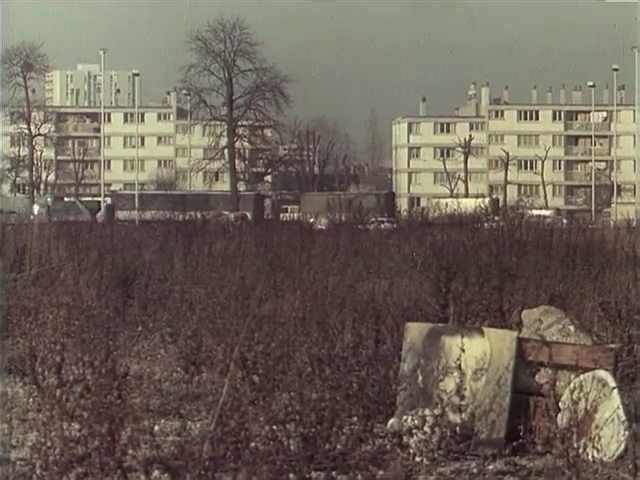
#Bales2023FilmChallenge #RaúlRuiz #SilkeHumel #EvaSimonet #RobertDarmel #JorgeArriagada #DenisLenoir #PatriceMorere #drama #crime #melodrama #ShortFilm #photography #animals #gender #prostitution #France #1970s ★★★★☆
“He's a peasant. Without looking into his situation, words are all he has.”شكاوى الفلاح الفصيح [El-Fallâh el-fasîh / The Eloquent Peasant] (Chadi Abdel Salam, 1970)
Dec
23
National Farmers Day – India
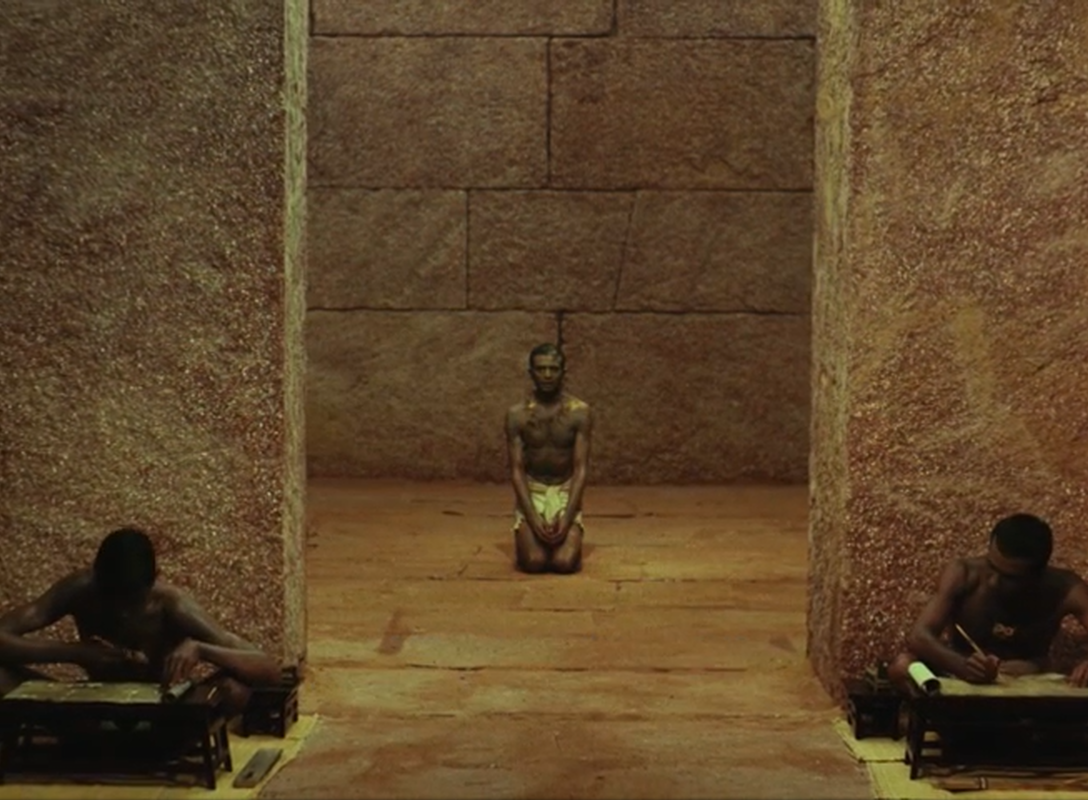
The peasant (Ahmed Marei) in a stone temple, flanked by scribes. DP: Mustafa Imam.
Farmers for Kisan Divas [National Farmers Day] (India)
4000 years ago, Egypt, Middle Kingdom. A peasant, leading his mules past a stream of water, is tricked. With his animals gone, he pleads to the Pharaoh to restore Maʽat, harmony.
Chadi Abdel Salam is not only this film's director, but also a trained architect, later set and costume designer. His eye wordlessly speaks the passing of time in the smallest of details. The withering of ferns, desert sand staining linen, the Sun merging with skin. At once, the universal presence of the gods becomes visible.
“We'll go back to Nice tomorrow. The Bay of Angels brings us luck.”La baie des anges [Bay of Angels] (Jacques Demy, 1963)
Dec
23
pears

A blonde Moreau at a restaurant table with a man seen from the back. There are several semi-empty wine glasses and pears sliced lengthwise on a plate, covered with a napkin. Jeanne's character Jackie Demaistre is holding a small sheet of paper with a schematic drawing of a roulette wheel while throwing the man a sceptical glance. DP: Jean Rabier.
– Jean Fournier
“We say hip, hooray,
Hip, hip hooray,
For fat!”Angel, Angel, Down We Go [Cult of the Damned (Robert Thom, 1969)
Dec
22
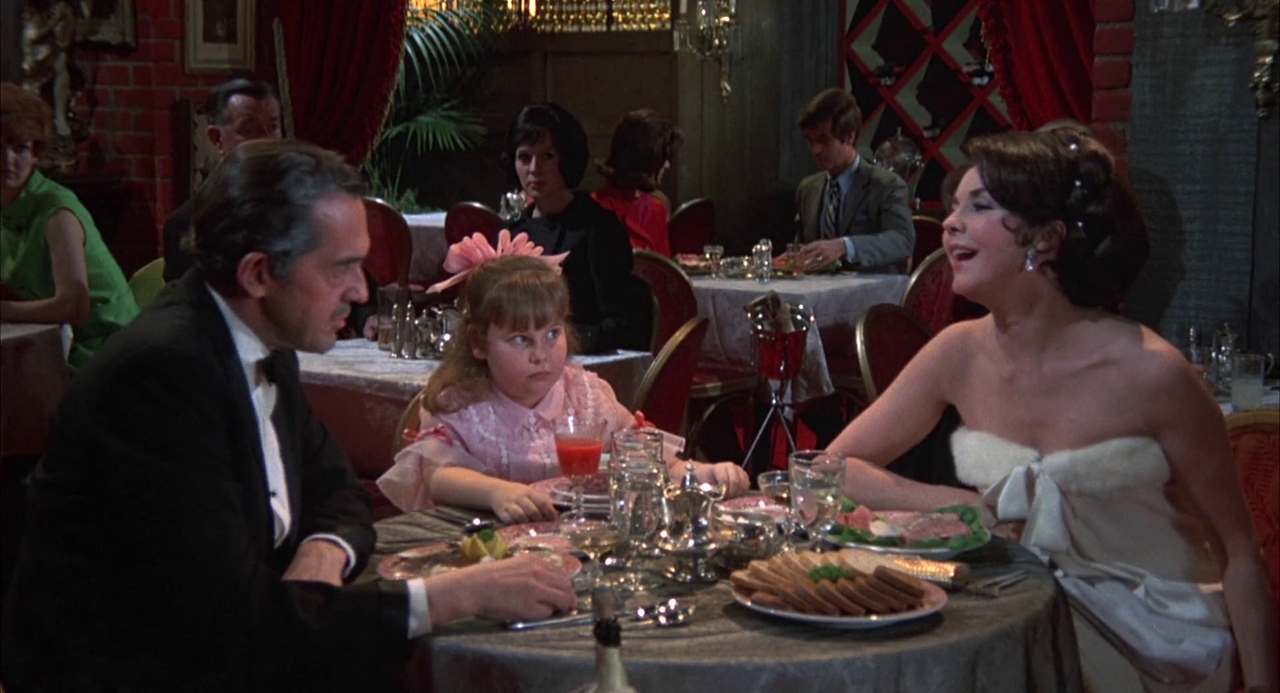
A chubby, piggy pink-dressed debutante (Joan Calhoun) flanked by her uppity-class parents (Charles Aidman and Jennifer Jones) in a fancy restaurant. The kid gives her mother the side eye. Other eaters look on in shock. DP: John F. Warren.
– Barry Mann & Cynthia Weil, The Fat Song
“I am big. It's the pictures that got small.”Sunset Boulevard (Billy Wilder, 1950)
Dec
21
Short Girl Appreciation Day
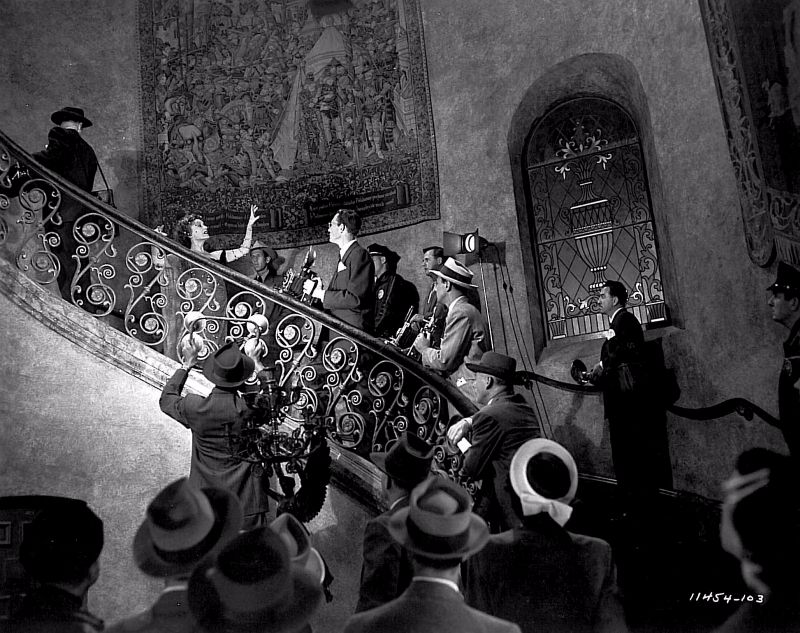
Norma Desmond (Gloria Swanson) descending an ornate staircase. The size of the set gives you an approximate idea of her height. Even when several steps above him, Swanson's dwarfed by the photographer in the dark suit and glasses. DP: John F. Seitz.
The main character is a “short girl” [I do not agree with the infantilizing wording] on Short Girl Appreciation Day (USA)
The great Gloria Swanson (4'11” – 5ft 2 / 1,49 m) – fabulously decked out by Edith Head (5'1” / 1,55 m) with an endless parade of platform shoes – in Billy Wilder's Sunset Blvd. (1950).
– Norma Desmond
Also starring, Buster Keaton, who was 5'5” / 1,65 m.
“Sie können sich einen anderen Beruf aussuchen. Sie sind ein toter Mann.”Nasser Asphalt [Wet Asphalt] (Frank Wisbar, 1958)
Dec
20
National Greg Day
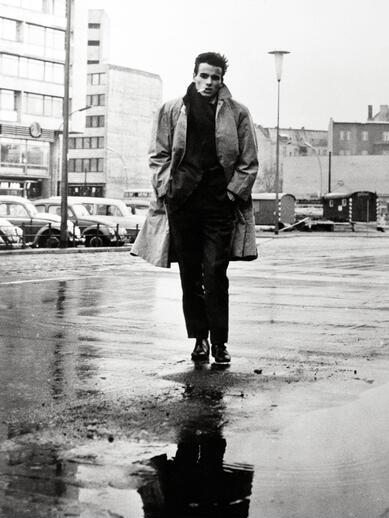
Greg Bachmann (Horst Buchholz) walking the rainy streets of Berlin. The scene is a direct reference to Dennis Stock's 1955 portrait of James Dean. DP: Helmuth Ashley.
Someone named Greg for National Greg Day (USA)
“Only a child can kill the monster.”Si muero antes de despertar [If I Should Die Before I Wake] (Carlos Hugo Christensen, 1952)
Dec
19
National Hard Candy Day

Lucio (Néstor Zavarce) and his new friend sharing one of her fancy 10¢ lollipops. DP: Pablo Tabernero.
Eating hard candy on National Hard Candy Day (USA)
Lucio is the class clown, a ne'er-do-well relying on his police-dad's rank and classmates' homework. One of these classmates, a smart little girl, promises him fancy lollipops in exchange for protection. And she has a secret for him too, about the origin of the candy, and the nice man giving her those and other nice things. Under oath, she tells Lucio everything and then promptly disappears. With his friend gone, killed as he later finds out, and an oath weighing on his heart, what can Lucio do when another girl goes missing?
– narrator
Cornell Woolrich's haunting tales of childhood lost leaped from Ireland to Argentina. With some similarities with Fritz Lang's M (1931), this fairy-tale feels more oppressive; due to the helplessness of a boy's power in an adult world and his understanding of grown-up responsibilities. A restored version in wider circulation is long overdue.